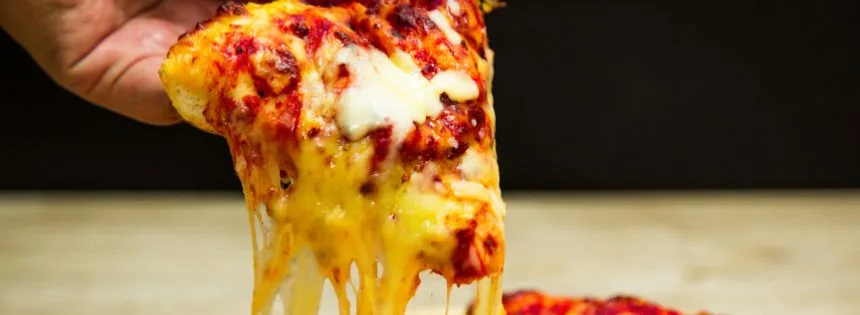What you’re getting yourself into
Why catastrophising cheat meals does more damage than the cheat meal itself.
The message came through at 11:47 PM.
“I need to confess something,” my client wrote. “I ate pizza at my son’s graduation party. Two slices. I feel terrible. Did I just undo four months of progress? Should I do a three-day fast to fix this? I can’t believe I was so weak.”
I stared at my phone. It was nearly midnight for him. He’d been sitting with this guilt for hours, probably spiraling while his family celebrated one of life’s proudest moments.
My reply was brief: “Congratulations to your son. Go to bed. We’ll talk tomorrow.”
This was the third message like this I’d received that week. Grown adults, successful people, treating a slice of pizza like a criminal offense.
When did carnivore stop being a way of eating and start being a confessional booth?
The Anxiety That Does More Damage Than The Food

If you’ve spent any time in carnivore circles, you know the feeling. That constant low-level worry that one wrong bite will destroy everything you’ve built. That somehow, a cookie has the power to undo months of healing and send you spiraling back to square one.
It’s exhausting. And here’s the uncomfortable truth nobody wants to acknowledge: the stress you’re generating over that one meal is probably causing more damage than the meal itself.
I’m not here to tell you that carnivore doesn’t work, or that nutrition doesn’t matter, or that you should abandon everything and eat whatever you want. What I am here to tell you is that catastrophising over a single deviation isn’t just unnecessary: it’s actively sabotaging your progress.
Your Body Is Tougher Than You Think
Let’s get one thing straight: one meal containing carbohydrates does not erase four months of metabolic healing. Your body doesn’t have an undo button that gets triggered by bread.
Think about what your body has survived throughout human history. Famines. Seasons where food was scarce. Periods where our ancestors ate whatever they could get their hands on just to survive. Your metabolism is designed to handle variability, not shatter at the first sign of glucose.
Will you temporarily drop out of ketosis? Probably. Will you hold onto some water for a day or two? Likely. Will your autoimmune symptoms come roaring back after one meal? Extremely unlikely.
Your body is resilient. It’s been quietly repairing itself meal after meal, day after day, for months. That doesn’t vanish because you ate your kid’s birthday cake.
The Healing That’s Actually Been Happening

Here’s what’s really been going on while you’ve been eating carnivore, and why it’s far more robust than you think.
With every meal you eat, you’re giving your body exactly what it needs. Complete proteins that contain all the building blocks for repair. Nutrients in their most usable forms, iron your body can actually absorb, vitamins that don’t need conversion, fats that satisfy and sustain. No blood sugar roller coaster. No constant hunger. Just steady, reliable fuel.
Day after day, inflammation has been cooling down throughout your system. Your gut has been catching a break from the compounds in plants that irritate it. Your digestion has gotten simpler, more efficient. You’re sleeping better because your blood sugar isn’t crashing in the middle of the night.
Week after week, deeper changes have been taking root. Your gut lining has been sealing up holes that took years to develop. The bacteria in your digestive system have been shifting toward strains that work well with animal foods. Your mind has been getting clearer as your brain gets consistent, quality fuel.
Month after month, your hormones have been finding their balance. Your body composition has been changing: more muscle, less inflammation, particularly around your organs. Autoimmune flare-ups have been quieting down. Energy levels have been rising and stabilising.
Over several months, things you thought were just part of aging or genetics have been improving. Joint pain. Brain fog. Skin problems. Digestive issues. Mood swings. These changes run deep: down to how your cells produce energy, how your body handles stress, how your immune system operates.
Here’s what you need to understand: none of this disappears because you ate pizza at a graduation party.
Your gut lining that’s been healing? Still healed. The improvements don’t just evaporate. Your microbiome? Still adapted to the way you’ve been eating. Your hormones? Still balanced. One meal doesn’t reset months of physiological change.
Yes, you might retain some water. Yes, you might feel a bit bloated or off for a few hours. But the fundamental healing: the deep cellular changes that have been accumulating, those persist. They’re built into your tissues now. They don’t wash away.
If you spent six months building muscle at the gym, would missing one workout erase all that progress? Would your muscles disappear overnight? Of course not. The adaptations stick around.
Your metabolism works the same way.
95% Carnivore Still Wins

Here’s a perspective shift that might help: eating carnivore 95% of the time is still dramatically better than eating any other diet perfectly.
Let’s break it down. Three meals a day for a week equals 21 meals. If one of those meals includes something outside your usual carnivore foods, you’re still eating carnivore for 20 out of 21 meals. That’s 95% adherence.
Now compare that to someone who never deviates from a “clean eating” approach. They’re still dealing with the inflammatory compounds in plant foods at every meal. Their blood sugar is still spiking and crashing throughout the day. They’re still getting nutrients in forms their body has to work hard to use, often with limited success.
Or someone perfectly following a standard healthy diet: whole grains, plenty of vegetables, lean proteins. They’re doing everything “right” according to conventional wisdom, but they’re still facing blood sugar swings, incomplete proteins, and compounds in plants that interfere with mineral absorption and create inflammation.
Meanwhile, you’re eating carnivore 95% of the time. That means 95% of your meals are giving you exactly what your body needs in forms it can actually use. Stable blood sugar nearly all the time. Minimal inflammation. Complete nutrition. Your body spending most of its time in that optimal healing state.
That one meal where you had some pasta at your anniversary dinner? It’s a rounding error. It’s background noise in the larger pattern of how you’re fueling your body.
You’re still running circles around every other dietary approach out there.
This Isn’t a Religion (Though Some Treat It Like One)

Let’s talk about what’s really happening in parts of the carnivore community.
Somewhere along the way, some people turned a dietary strategy into a purity test. There are now unofficial rules about what “counts” as real carnivore. Judgment about who’s committed enough. A hierarchy based on how strictly someone adheres.
This isn’t unique to carnivore. Every dietary community does this. Paleo had its food police. Keto has its gatekeepers. Don’t even get me started on vegan spaces.
But here’s the problem: when food becomes a moral issue, eating stops being about nourishment and becomes about worthiness. You’re either “good” (perfectly adherent) or “bad” (you ate something outside the rules). There’s no nuance. No middle ground.
This is exhausting and, frankly, unnecessary.
“I’m 100% carnivore” shouldn’t come with an implied “and I’m better than people who aren’t.” This is a way of eating that works remarkably well for a lot of people. It’s not a personality trait or a measure of your character.
When we turn it into a purity test, we create shame spirals that do real damage. You eat something off-plan, feel terrible about yourself, stress about it, that stress causes inflammation and disrupts your sleep and digestion, which causes more problems than the food did, which you then blame on the food, which makes you more anxious about ever deviating again.
It’s a self-perpetuating cycle of misery.
The Stress Is The Real Problem

Here’s what actually happens when you catastrophise about eating pizza.
Your body doesn’t differentiate between real threats and imagined ones. When you work yourself into a panic about “undoing everything,” your stress response kicks in. Cortisol rises. Your digestion slows down. Your sleep gets disrupted. Your decision-making gets clouded.
And that stress? It causes inflammation. The kind of systemic inflammation we’re trying to avoid by eating well in the first place.
So you end up creating the exact problem you’re afraid of: not through the food you ate, but through your reaction to eating it.
The research on stress and inflammation is crystal clear. Chronic psychological stress is a major driver of inflammatory diseases. The occasional slice of cake? Not so much.
There’s also the deeper issue: if every deviation feels like a catastrophe, you’re training your brain to fear food. That’s not a healthy relationship with eating. That’s the foundation for disordered eating, just with a different aesthetic.
What About Genuine Consequences?
“But I really do feel terrible after eating carbs. It’s not in my head.”
Fair point. Let’s make a distinction.
Noticing: “I ate a sandwich and felt bloated for a few hours. My digestion felt slower. This is good information about how my body responds.”
Catastrophising: “I ate a sandwich and now I’m destroying my gut lining. All the healing is undone. I’ve set myself back months. I’m a failure.”
See the difference?
Some people do have real sensitivities. Autoimmune conditions that flare with certain foods. Digestive systems that genuinely struggle with grains or specific compounds. These responses are real and worth noting.
But even for people with sensitivities, one exposure doesn’t undo months of healing. Your gut lining doesn’t permanently break open because you ate rice once. Your immune system doesn’t forget everything it’s learned.
If you have celiac disease or a true severe allergy, that’s a different conversation. But most people have sensitivities that cause temporary discomfort, not lasting damage.
Learn to tell the difference between what’s genuinely harmful and what’s just uncomfortable for a few hours.
What Actually Matters

Here’s the only question that really counts: What are you doing most of the time?
If you’re eating carnivore 95% of the time, that’s what shapes your results. Not the 5%.
That 95% means you’re giving your body optimal nutrition almost all the time. Your blood sugar stays stable most days. Your inflammation stays low nearly all the time. Your gut gets to heal consistently. Your energy production runs smoothly. All the benefits of this way of eating: they’re determined by the pattern, not by the exceptions.
That meal where you had some cake at a wedding? Doesn’t change the overall trajectory of your health.
But here’s what does change it: spending half your mental energy obsessing about that 5%. That’s when you’re not thriving. You’re just anxious while eating meat.
The goal isn’t perfection. It’s a sustainable way of eating that makes you healthier without making you crazy.
This all-or-nothing mindset is a trap. It’s the same thinking that makes people completely abandon their diet after one “bad” meal. “Well, I already had fries, so I might as well get dessert and pizza and just start over Monday.”
You know what works better? Having the fries, then eating your normal dinner. One meal. Not a downward spiral. Not an identity crisis. Just one meal.
Keep It Simple
Here’s what you actually need to do:
Stop using moral language around food. You didn’t “cheat” or “fail” or “fall off the wagon.” You ate food that wasn’t your typical choice. That’s all. The dramatic language makes everything worse.
If you feel fine after eating something, great. If you feel temporarily off, note it and move on. Your next meal is your opportunity to get back to what works. No punishment needed. No fasting to “make up for it.” Just eat normally.
If you’re constantly eating outside carnivore and then beating yourself up, take a step back. Maybe the all-or-nothing approach isn’t sustainable for you right now. A less rigid version you can actually maintain beats a perfect version that makes you miserable.
Learn the difference between physical symptoms and anxiety. Are you actually feeling effects from the food, or are you anxious about potential effects? Real responses are consistent and predictable. Anxiety is all over the place and thought-driven.
If thinking about food rules is consuming your life, if you’re avoiding social situations because of food, if eating something off-plan sends you spiraling, you’re dealing with something beyond diet. That’s worth getting support for.
The Bottom Line

You ate something. Your body is processing it. Maybe you’ll feel a bit off for a few hours. Maybe you won’t. Either way, it’s temporary.
The catastrophe you’re imagining? It exists only in your head.
Carnivore is a powerful dietary approach. It’s aligned with how humans evolved to eat. It works incredibly well for a lot of people. But it works best when you approach it with some rationality and perspective, not by treating every meal like a moral test.
How you respond to eating something off-plan matters more than the food itself. Spiral into guilt and stress, and you’ll create real problems: cortisol spikes, inflammation, disrupted sleep. Acknowledge it happened and move on, and there’s no problem at all.
Your body is resilient. Your progress is robust. And your worth as a person has absolutely nothing to do with what you ate at your son’s graduation party.
So please, stop sending panicked messages at midnight. Get some sleep. The pizza isn’t that serious.
Eat your meat. Enjoy your life. Stop treating food like a religion.
Your body will thank you for the consistency, not the perfection. And honestly, so will everyone who doesn’t have to hear you catastrophize about sourdough anymore.
Now if you’ll excuse me, I have another client who needs to hear that having some potatoes at Thanksgiving didn’t erase months of healing. This seems to be a theme.
Read My Previous Article – 27 Carnivore Dangers Debunked
If you want to figure out the best way to set up your own metabolic revival, reach out to me on Twitter, Instagram, or sign up to my coaching programme below for customised hypertrophy programmes and carnivore nutrition plans that will ditch all the unnecessary fluff and send you hurtling towards your physique goals.





Thank you for this information. Definitely helpful and true. I’m carnivore for almost 2 years now and just recently have had an occasional non carnivore meal. I enjoy carnivore and feel my best so the odd time I have something else isn’t an issue. Sometimes it’s other people judging you and or waiting for you to fail (by their standards). It says more about them than about me. I know my truth. Thank you.
All you can do, is concentrate on your own path, and abide by the standards you’ve set for yourself.